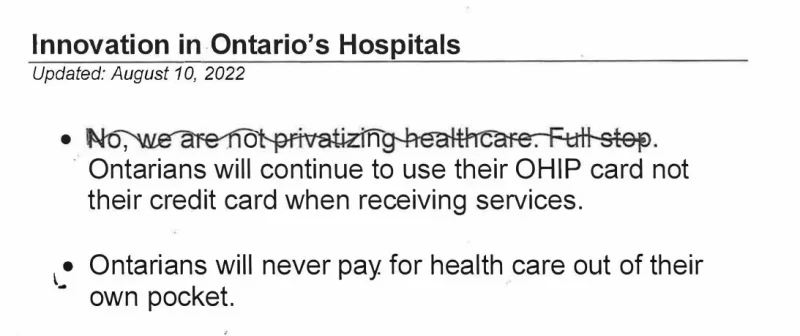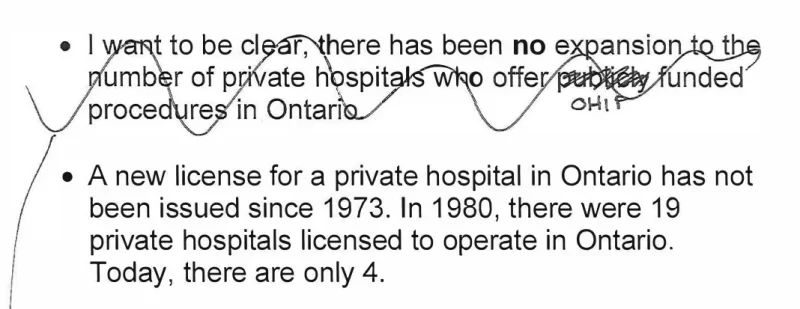Ontario health minister’s talking points edited to remove denial of privatized health care
Posted: November 17, 2022
(November 16, 2022)
By: Isaac Callan and Colin D’Mello, Global News
As the Ford government faced intense questions during the summer about the private delivery of health-care services, a set of talking points given to Ontario’s Minister of Health included a forceful denial of privatization — words which were never uttered by Sylvia Jones because they were scratched out from her speaking notes.
A copy of Sylvia Jones’s house binder, obtained by Global News through a freedom of information request, carries staff-prepared talking points on a variety of subjects related to her $75 billion portfolio and included a categorical rejection of privatization.
“No, we are not privatizing healthcare. Full stop,” the document reads. “Ontarians will continue to use their OHIP card not their credit card when receiving services.”
Sometime in August 2022, however, the document was amended and the key phrase, “No, we are not privatizing healthcare” was scratched out. The commitment was never uttered by Ontario’s minister of health.
A search of transcripted house debates from August onwards for the sentence removed from Jones’ house binder did not return any results.
Part of a page in Sylvia Jones’ house binder, where a talking point appears to have been removed.
Global News
“We’d like to direct you to her comments from the same day as the request,” a spokesperson for Jones’ office said. “The Minister has been clear all along, Ontarians will continue to use their OHIP card to access health care.”
Jones made several references to OHIP on Aug. 11 — the day after Global News submitted its freedom of information request — but specific wording about privatization was not used.
“No, no, no — OHIP cards are used in the province of Ontario to fund publicly funded health-care systems,” Jones also said on Aug. 11. “That will continue under our watch… we will continue to fund OHIP services through our health care system.”
The scored out specific commitment was not mentioned.
Jones’ office did not explain who would have made the changes to the house binder or why.
Ministers are given house binders in the legislature with government talking points, statistics and key messages.
“The house binder is basically a massive cheat sheet for ministers going in question period or during debate,” said Ashley Csanady, a senior consultant for McMillan Vantage and a former Ontario Liberal staffer and journalist.
She said that both non-political and political staffers contribute talking points to the document. Chiefs of staff, directors of communication and the minister herself are among those with access, she said.
The photocopy obtained by Global News shows several changes were made to a page entitled “Innovation in Ontario’s Hospitals,” which says it was updated on Aug. 10 within the minister’s house binder.
Another talking point also appears to have been axed.
“I want to be clear, there has been no expansion to the number of private hospitals who offer publicly funded procedures in Ontario,” the original note said.
The word “publicly” was scrubbed out and replaced by the handwritten word “OHIP.” The entire talking point was scored out.
A photocopy of Sylvia Jones’ house binder suggests edits were made to remove language around private health care.
Global News
Near the bottom of the page, the word “publicly” has been removed from another talking point, so a later bullet point says, “These facilities already perform OHIP funded procedures” instead of saying “publicly funded procedures.”
“In this, it looks to me as if there was a set of messaging that was being proposed as very definitive, ‘We will not increase any private role for health care in Ontario,’” Csanady said.
“And that made it as far as the binder and then someone — maybe the minister herself, maybe the chief of staff, maybe the director of communications — said that is too far.”
On Aug. 18, Ontario unveiled a five-point plan to tackle delays, staffing shortages and backlogs within the province’s struggling health-care system.
To reduce wait times, the province decided to look at increasing “surgeries in paediatric hospitals and existing private clinics covered by OHIP.”
That change was announced eight days after the health-care innovation talking points were drafted for Jones to repeat in the legislature.
Health minister met with private hospital
In July, during her orientation as Minister of Health, Jones met with a private hospital. Her calendar, which was also obtained through a freedom of information request, lists a meeting with Clearpoint Private Hospital.
The hospital’s website describes it as “one of the few public/private hospital licenses under the Ontario Ministry of Health.”
A spokesperson for Jones did not address a question asking if this meeting was related to announcements about private hospitals made in August.
The binder also includes several messages apparently curated on March 31 for then-Minister of Health Christine Elliott to push back against a campaign by the Ontario Health Coalition accusing the Ford government of privatizing the province’s health care.
“This government is focused on building a better and more robust publicly funded health care system for the future,” one line says.
Another adds, “A new license for a private hospital in Ontario has not been issued since 1973.”
Neither line was edited or annotated in the photocopy obtained by Global News.
The Ontario Health Coalition launched a campaign, including lawn signs, to fight against “the Ford government’s unprecedented health care privatization plans.”
In an August sit-down interview with Global News, the CEO of Ontario Health said the private sector has historically operated independently in Ontario and suggested the continuation of that system could lead to additional poaching.
“We’ve got to be careful about this, and we can’t be taking from the public system over into the private system. It’s a zero-sum game,” Matthew Anderson told Global News.
Jones has said Ontarians shouldn’t be “afraid of innovation.”
Anderson pushed back on the assertions of privatization and said that’s not what Ontario Health is advocating for.
“If my family hears ‘privatization’ their mind will likely go to funding. They will be concerned that they now have to pay out of pocket to get access to something. And the premier has made that clear, we’re not talking about additional private-funded services,” Anderson said.
Click here for original article




